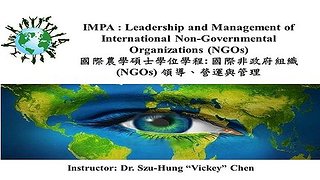課程介紹
[Course Description]
- This is a 3 credit hour, face-to-face and distant-learning hybrid course.
- Also, it is a teaching collaborating course operated by NCHU and Texas A&M University (TAMU), USA.
- In this course, we will review and discuss fundamental concepts, topics relating to International Non-Governmental Organizations (NGOs), case studies involving resilience in agriculture or rural sustainable development, perform exercises of leaderships development (e.g., Leadership Panel) .
- Our goal is to inform and exchange views. For each topic, your objectives are to understand the fundamental problems and potentials of each situation and to develop effective strategies when acting as a leader.
- At the onset, the instructor will work with students to learn implication s as an agricultural leader, and to develop their final projects as professional practicum.
- Students are expected learn the methodology on integrated assessment of an NGO of his/her choice on the efficacy of the organization and/or its programs.
[Guest Instructor]
Dr. Jack Elliot
Professor, Department of Agricultural Leadership, Education, and Communications, Texas A&M University (TAMU);
Senior Scientist, Norman Borlaug Institute for International Agriculture, TAMU
Website: https://alec.tamu.edu/people/elliot-dr-jack/
[Course Objectives]
This course is designed to:
- To present trends and increasing power of NGOs relating to natural resource management, agricultural resilience and/or rural sustainable development;
- To help students gain in-depth understanding of the organizational structures, functions, planning and management processes of NGOs;
- To provide students with real world exposures and to help cultivate students' technical skills and leadership qualities for possible professional careers.
[Course Delivery]
- This is a face-to-face and distant-learning hybrid course.
- All class materials can be accessed through NCHU iLearning. NCHU iLearning may also be used to conduct parts of class assessments, to submit course assignments, to send announcements and so on. NCHU iLearning can be accessed via https://lms.nchu.edu.tw/.
- Teaching methods include:
- Previewing and reviewing course materials.
- Leading and participating discussion forums.
- Assignment write-up.
- Practicing materials collection, synthesis, and analysis.
- Leadership development panel exercise.
- Final project development.
- Office hours are running by the appointment-based policy.
教科書:
- Class handouts and a list of assigned readings provided by the instructor through NCHU iLearning.
- Other supporting reference (NOT required to purchase): Crowley, J., & Ryan, M. (2013). Building a better international NGO: Greater than the sum of the parts? Boulder, CO., London, U.K.: Kumarian Press.
教學進度:
Thursday, 9 am to 12 pm ; Online sections
請先報名此課程才可瀏覽教材

